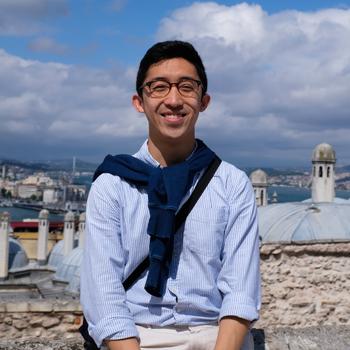Alexander Lin (University of California, Berkeley)
Doctoral Fellow in Research Area 2: "Travelling Matters"
January–June 2024
Ekphrasis as Interruption: Modern Writing Confronts the Fetish of Ancient Art
A written description of an art object must negotiate the relation of word and image between the temptation of two fantasies: that the word should overcome its arbitrariness and take on the concreteness of the image, or that the image should overcome its muteness and assume the discursive meaning of the word. Both concrete word and speaking image hinge on the viewing experience of the writer, who in turn represents and reenacts this experience by deploying the form of a vivid description of the artwork—what since ancient rhetoric has been termed ekphrasis.
By reading a constellation of ekphrastic writing in German, English and Japanese from the 18th to 20th centuries, this project theorizes the modern and transnational deployment of ekphrasis in response to the problem of the image as fetish object—particularly the ancient cult object secularized, aestheticized and reproduced as artwork. At once excessively fungible in its commodification (Benjamin) and material to the point of opacity (Freud), the fetish becomes a sign mirroring the key problems faced by linguistic representation.
Writers such as Peter Weiss and Kamei Katsuichirō confront the apparent international failure of Marxist historical teleology in the 1930s by activating the ekphrastic tradition of Goethe's Italian Journey. In Weiss' description of an epiphanic encounter with the Pergamon Altar, as in Kamei's of Hakuhō-period Buddhist statues, confrontation with ancient religious plastic art arrests history as a formless flow and provides language with a new form-giving principle. On the other hand, Mishima Yukio and T. J. Clark, following Nietzsche and Ruskin, both represent repeated encounters with medieval and early modern architecture and painting to release a sense of conflict-filled duration from timeless monumentalism.
Both epiphanic and durational modes of ekphrastic writing stage problems of modern aesthetic theory in encounters with a range of premodern art objects to create an interruption in the flow of language. The word appropriates its specific difference vis-à-vis the image as experienced in the encounter with the latter and, in so doing, recuperates its specificity out of a fetishistic conflation of the two.
Alexander Lin is a PhD candidate in the Department of Comparative Literature at the University of California, Berkeley. He works primarily on 20th century prose fiction, lyric poetry and criticism in German, Japanese and English, with interests in critical theory, reception of ancient and medieval art and the relation between religion and philosophy. His dissertation project assembles an original, transnational grouping of modern narrative prose focused on encounters with artworks to theorize ekphrastic description as the paradigmatic literary topos for negotiating the problem of the materiality of signs. He was affiliated with the Humboldt University as a Fulbright Fellow in 2022-2023.
